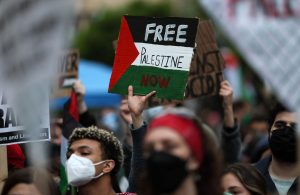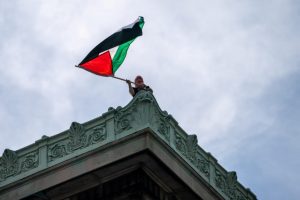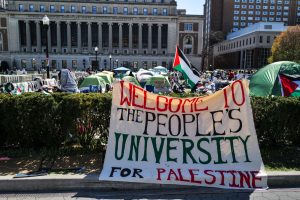15 May 2024
Prologue
 The protests against Israel’s assault and disproportionate war on Gaza started in April this year at Columbia University, an Ivy League university in New York. This protest has since swept college campuses nationwide, and thousands of students and their faculty members have been arrested. Thereafter, the protests have spread to other campuses around the globe from France to Australia. Some likened it to the latest in a tradition of student-led, left-leaning activism dating back to the civil right and anti-Vietnam war movement in the 1960s. The students have been calling for their universities to divest from corporations that shamelessly profit from the Israel’s incursion of Gaza that have killed almost 35,000 people and maimed more than 70,000. Below is a transcript of an interview conducted by Mohsen Haddadi (MH), of the International Qur’an News Agency (IQNA) with Dr Ahmad Farouk Musa (AFM), Founder and Director of the Islamic Renaissance Front of Kuala Lumpur recently.
The protests against Israel’s assault and disproportionate war on Gaza started in April this year at Columbia University, an Ivy League university in New York. This protest has since swept college campuses nationwide, and thousands of students and their faculty members have been arrested. Thereafter, the protests have spread to other campuses around the globe from France to Australia. Some likened it to the latest in a tradition of student-led, left-leaning activism dating back to the civil right and anti-Vietnam war movement in the 1960s. The students have been calling for their universities to divest from corporations that shamelessly profit from the Israel’s incursion of Gaza that have killed almost 35,000 people and maimed more than 70,000. Below is a transcript of an interview conducted by Mohsen Haddadi (MH), of the International Qur’an News Agency (IQNA) with Dr Ahmad Farouk Musa (AFM), Founder and Director of the Islamic Renaissance Front of Kuala Lumpur recently.
MH: How do you evaluate the significance of campus protests in the US and elsewhere in raising awareness about the Palestinian issue and the occupation?
AFM: First of all, let’s take a few steps back in time. On 17 December 2010 in Sidi Bouzid, Tunisia, Tareq El-Tayeb Mohamed Bouazizi set himself on fire. This act of self-immolation became the catalyst for the Tunisian revolution and the rise of the Arab Spring against autocratic regimes in the Middle East and North Africa. We should not forget that history. Similarly, on 17 April 2024, the Pro-Palestine protest movement was sparked at New York’s Columbia University when students pitched tents in the middle of campus and began rallying in support of Palestinians in Gaza. I believe no one expected this. From one campus in New York City, it has now spread to more than 100 campuses in the United States and we find similar encampments in universities in other parts of the world as well. They are demanding that academic institutions sever their financial ties (the so-called divestment) with Israel or companies connected to the Israeli military’s war in Gaza. We see that these demonstrations were not only by students but also their professors and the academic staff who voiced out for Gaza.
MH: How effective these protests can be for putting international pressure on Israel to end the war on Gaza?
AFM: So far it is hard to say since the current student protests were not of the same magnitude as those for the anti-Vietnam war 60 years ago. Although there are some resemblances, Vietnam War protests began among the leftist intellectuals on campus and the peace activists, but gained more prominence after the US started bombing North Vietnam in 1965. In October 1967, some 100,000 protestors gathered at the Lincoln Memorial and 30,000 of them marched towards the Pentagon that night. In my view, unless we have this critical mass, we cannot effect any change. Moreover, we know that Netanyahu acts without any impunity and as long as the US keeps supplying weapons to the Israelis, I don’t think the war will stop. In fact, I read yesterday that billions of dollars of US arms remain in the pipeline for Israel. The US has been the largest arms suppliers to Israel, followed by Germany (perhaps to atone for their past holocaust) and Italy. So now I wonder whether what the US has been preaching all along about democracy and human rights were actually genuine or simply the highest manifestation of hypocrisy.
MH: Some experts say that the protests show that the new generation is more aware of the situation in Palestine and this, in the long run, can help Palestinians. What is your take on this?

AFM: Well, almost every social media network has consistently shown that the majority of people are overwhelmingly pro-Palestine—especially the Gen Z. Let us look at the Gallup poll to understand this. March 2023 Gallup poll found that while baby boomers had a 46% “net positive sympathy level” with Israel, millennials had a -2% net negative sympathy level. That is, more sympathized with Palestinians than with Israelis. I believe that the support Israel received from older generations is due to World War 2 remembrance and Islamophobia. Before the advent of social media, mainstream media had an unchallenged monopoly to disseminate manufactured truth that they wanted people to believe. Not surprisingly, the information that they spoon-fed to the masses was subject to strong governmental influences and lobby groups with vested interests. But nowadays, young people are internet savvy. They can tell apart old and new videos. They have managed to spot videos circulated online which were misleadingly attributed to Hamas when in reality, they were old videos from other groups in the Middle East, not Hamas. However, the real turning point happened when people who just learnt about this and then called out the actions of Israel were immediately shut down with claims of being antisemitic. This crystallised Zionism‘s villain-hood in people’s minds. So in my opinion, Israel is losing the propaganda war. And whether this will lead to a shift in the Palestinian struggle we have yet to see, although I’m personally optimistic with the change.
MH: Some universities in the US allowed the police into the campus to disperse the protesters and as a result hundreds of students and even faculty members have been arrested, sometimes violently, by the police. This has raised debates about freedom of expression and the hypocrisy of Western authorities. What is your take on this?
AFM: We have read about riot police entering several college campuses at the behest of administrators to break up encampments protesting the war in Gaza and calling on their universities to the universities’ divestment from Israel. I would say that those scenes of police arresting hundreds of students at Columbia and UCLA are reminiscent of police and National Guard actions against the protestors of the Vietnam war in the late 1960s. Of course, it is tempting to draw parallels with the worst examples of overreaction against those anti-war students in the 1960s. Just to give one example: over 54 years ago, the Ohio National Guard fired into a crowd of anti-war protesters on the campus of Kent State University, killing four students and injuring nine. Eleven days later, city and state police fired on protesters at Jackstone State College, Mississippi, killing two students. In the aftermath of Kent State and Jackson State in 1970, the former Pennsylvania governor chaired a President’s Commission on Campus Unrest. Its central conclusion was that there was a fundamental crisis of understanding between the older and younger generations. The report debunked the idea that “outside agitators” were to blame for escalated violence. Perhaps more importantly, the 1970 commission claimed that the root of campus unrest lay with the university’s faltering moral authority—or what some protesting students at the University of Chicago today see as hypocrisy. This is another instance of Western hypocrisy regarding freedom of speech and expression. But what I am sure is that they don’t want another repeat of this catastrophe. Looking back to the protests of the 1960s, it’s clear the campus shootings at Kent State and Jackson State were avoidable, and there was no need for police and state responses to be so draconian and heavy-handed. This is something that the law enforcement should be keeping in mind today. So they should exercise restraint in facing this type of protest.
MH: What role do you believe faculty should play in student-led protests?
 AFM: I think some universities have handled protesters better than others. For example, Brown University in Rhode Island—like Columbia, an Ivy League institution—negotiated an agreement that ended the unauthorised encampment there. A few other universities have taken a similar approach. Indeed, Columbia itself negotiated a settlement with the anti-apartheid movement in 1985, so it is not unreasonable to expect that an alternative path could have been followed to defuse the current situation. Lastly I have to say that the commission’s final conclusions may be even more useful now than they were in 1970: “The university must pull itself together… Any academic institution worthy of the name must protect the right of its students and faculty to express themselves freely—outrageously as well as responsibly.” Faculty members definitely have a major role to play in civil disobedience. On the one hand, they should support the students in their right to peaceful protest and seek to protect that right as much as possible. On the other hand, they also have the right to exercise academic freedom to disagree with the status quo and defend noble causes. It gives hope to see in the pro-Palestine protests faculty who have put their career on the line to walk out of classrooms, join protest marches and condemn police brutality as well as suspension and arrests of students.
AFM: I think some universities have handled protesters better than others. For example, Brown University in Rhode Island—like Columbia, an Ivy League institution—negotiated an agreement that ended the unauthorised encampment there. A few other universities have taken a similar approach. Indeed, Columbia itself negotiated a settlement with the anti-apartheid movement in 1985, so it is not unreasonable to expect that an alternative path could have been followed to defuse the current situation. Lastly I have to say that the commission’s final conclusions may be even more useful now than they were in 1970: “The university must pull itself together… Any academic institution worthy of the name must protect the right of its students and faculty to express themselves freely—outrageously as well as responsibly.” Faculty members definitely have a major role to play in civil disobedience. On the one hand, they should support the students in their right to peaceful protest and seek to protect that right as much as possible. On the other hand, they also have the right to exercise academic freedom to disagree with the status quo and defend noble causes. It gives hope to see in the pro-Palestine protests faculty who have put their career on the line to walk out of classrooms, join protest marches and condemn police brutality as well as suspension and arrests of students.
MH: Have you observed any impact on the academic environment due to the protests?
AFM: If you are referring to the academic culture in universities, no, I don’t think there was any change. College campuses and student activists have always been agents of change. Student activism in response to injustice is certainly not a recent phenomenon. We have always seen such activism in an attempt to redress grievances in the political dynamics of the world. As mentioned earlier, in the 60s, college students marched for civil rights and protested against the war in Vietnam. It was young people who championed these issues. It was young people who had the audacity to challenge some of the greatest injustices of the time. It was young people who championed peace and equality. So it is important that the significance of student-led movements is not only acknowledged but celebrated.
MH: How do you see these protests evolving, and what outcomes do you anticipate?
AFM: I think it is still early to predict anything. One thing for sure though is that the protesters are on the right side of history. But whether this protest will move on like the students’ movement against the apartheid rule of South Africa is yet to be seen. History has shown that between the 1960s and 1980s, US student activists led a nationwide movement to pressure their universities to cut financial ties with companies that supported South Africa’s apartheid regime—similar to the current call for divestment against the apartheid Israeli regime. They successfully pressured their universities to divest and sever financial ties with South Africa. But the fight against the Zionists is another story. The Zionists have a powerful Jewish lobby group in the US known as AIPAC (American Israel Public Affairs Committee) which is the main contact with the executive branch of the US government. Consequently, they will not take things lying down.
This interview was published earlier at the International Qur’an News Agency (IQNA) at https://iqna.ir/en/news/3488320/campus-protesters-%E2%80%98on-right-side-of-histroy%E2%80%99-thinker

